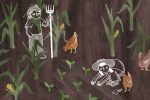Unlike most farmers, Nathan Christianson started his career by going to the University of Texas on a track scholarship. He ran cross country, as well as the 5,000 and 10,000 meter on the track. His body shows it: the tall, lanky, tan and longhaired 23-year-old looks and runs like Steve Prefontaine worn down to a leather patina.
Every day of college for more than two years Christianson ran every morning, went to school and ran every night. The sport dictated his diet and schedule, controlling when he took classes, who he befriended, what he did and where he lived. Despite his commitment, he suffered nagging injuries the entire time. Hip and knee issues limited him, and over time the sacrifice became greater than the reward. Midway through his junior year, Christianson quit the team.
“For the first time since middle school,” he says, “I wasn’t focused by running. All of a sudden I had this huge void in my life.” He was happier but the shift forced a psychological detox. Abandoning the rigidity of his structured lifestyle in exchange for complete freedom unsettled him. Christianson didn’t know what to do with himself.
“I wasn’t really ever planning on being a farmer,” he explains. His interest took root when some classes about the food system piqued his interest. “I was volunteering with Johnson’s Backyard Garden in Austin and just got more into farming,” he explains. For the first time since middle school, Christianson got to decide what he did with his time.
That summer he took advantage of his new freedom. “I was like, ‘Oh, I don’t have to train and stay in hot-as-shit Texas over the summer,” Christianson laughs. “I’m going to Montana.” He connected with Ten Lakes Farm in Eureka, Montana, and spent his summer working. He intentionally maintained a healthy skepticism about the longevity of his newfound passion, but he knew it was the real thing. “I came back to school in August, and after that experience I knew I wanted to put my energy into farming,” Christianson says. “I did everything I could to graduate that fall.”
Christianson scheduled an intense semester for himself that fall and in December 2013 he graduated with a degree in Geography. He returned to Montana to work for the same farmers as he had the summer previous. They had moved an hour south to Whitefish, Montana, and renamed their farm Two Bear Farm. Whitefish is a city of 6,000 in Flathead County, about an hour’s drive from Glacier National Park.
At Two Bear, Christianson received an entirely different education. “I would say to the owner that I was in farm college and that this was the Harvard of farm colleges,” Christianson jokes. He underwent two intense instructional seasons before moving 30 miles south to Kalispell to join his girlfriend on a different farm.
The new farm is significantly different. “It’s way smaller,” Christianson says. “I would definitely call it a boutique farm.” The three-acre organic farm foregoes synthetic herbicides and fertilizers, and the only machinery they have is a 1948 Ford 9N tractor. “We still cut down our cover crops with scythes,” says Christianson. “For a farm of our size that’s actually pretty common, though. It’s not a high-revenue operation so they don’t have the capital to put into machinery upgrades.”
In order to work as efficiently as possible, Christianson focuses on his perspective. “I like looking at farming like links a chain: every task consists of multiple smaller tasks,” Christianson explains. “If you zoom out, the entire season is just interconnected activities. You have to make those links as efficient as possible on a microscopic level.”
The same is true for running. “They’re super similar,” Christianson says. “When I ran, my training was very regimented and scheduled. Farming is consistency each day: when you water the plants, you water them the same way every day; when you’re running and you warm-up, you warm-up the same way every day. It’s all ritual, really.”
Like running, the commitment is half the battle. Christianson and his girlfriend are looking into buying land and starting a farm of their own, but buying a farm is life-changing. “Right now, because it’s not my farm, we get the weekends off,” Christianson says, adding, “but when you buy land it’s like getting married. When your friends are all going to Seattle for the weekend, you’re like, ‘I can’t, I gotta water my eggplant.’”
The time-commitment and massive capital investment discourage young farmers, but Christianson is certain of his decision. “My dream is to create a farm that provides a year’s worth of income in less than a year,” he says. “One where you and your family make most of your money over the summer so you can ski in the winter.” The goal is entirely feasible: Christianson already visits home in the offseason because winter prevents farming.
His family in Port Aransas appreciates the visits, especially after realizing the strength of Christianson’s conviction to farm in Montana. They had good reason to doubt him, though. “My family had a pretty good garden when I was growing up,” Christianson laughs, “but my dad could never get me to weed it. So they joke about that a lot.”












